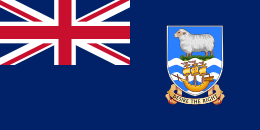Falkland Islands
The Falkland Islands (Islas Malvinas) are a remote South Atlantic archipelago. With rugged terrain and cliff-lined coasts, its hundreds of islands and islets are home to sheep farms and abundant birdlife. The capital, Stanley, sits on East Falkland, the largest island. The town’s Falkland Islands Museum has themed galleries devoted to maritime exploration, natural history, the 1982 Falklands War and other subjects.

-
Capital: Stanley
Important Cities:Port Howard, Port Louis, and Fox Bay.
Airports:
Domestic and International Air Connectivity:
The Port Stanley Airport provides domestic flights connecting various islands in the Falklands and has limited international air connectivity.
Airports Facilities:
Facilities at Port Stanley Airport are limited but include basic services for travelers.
Tourist Attractions:
- Falklands War Memorial: A historical site honoring those who fought in the 1982 war.
- Bleaker Island: Home to a large variety of bird species.
- Gypsy Cove: A picturesque cove with penguins and wildlife.
- Falklands Museum: Offers insights into the islands' history.
- Regional Sightseeing: The Falkland Islands offer stunning landscapes and wildlife-watching opportunities. You can explore the islands' remote and rugged terrain.
Currency:
The official currency of the Falkland Islands is the Falkland Islands Pound (FKP). British Pound Sterling (GBP) is also widely accepted.
Cuisine:
Local cuisine in the Falkland Islands is influenced by British traditions and includes dishes like fish and chips, meat pies, and fresh seafood.
Cultural Activities:
Cultural activities revolve around the islands’ history, including visits to war memorials and museums.
Accommodation:
Accommodation options in the Falkland Islands are limited but include lodges and guesthouses. While there are no traditional star-rated hotels, some options provide comfortable stays.
Transport Connectivity:
Transport within the Falkland Islands is primarily by road, and the islands have a small road network. There is no rail transport.
Population:
The Falkland Islands has a population of around 3,400 people.
Religion:
The majority of the population in the Falkland Islands adheres to Christianity, with various Protestant denominations being the most common.
Languages Spoken:
English is the official language of the Falkland Islands.
Disclaimer:
The information above is for reference, and we do not accept any liability for inaccuracies or updates.